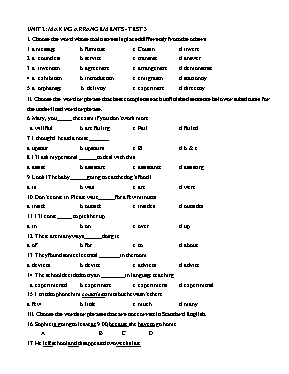Đề và đáp án kiểm tra bài 2 Tiếng anh lớp 8
Bạn đang xem tài liệu "Đề và đáp án kiểm tra bài 2 Tiếng anh lớp 8", để tải tài liệu gốc về máy bạn click vào nút DOWNLOAD ở trên

UNIT 2: MAKING ARRANGEMENTS - TEST 3 I. Choose the word whose main stress is placed differently from the others. 1. a message b. furniture c. Cousin d. invent 2. a. countless b. service c. transmit d. answer 3. a. invention b. agreement c. arrangement d. demonstrate 4. a. exhibition b. introduction c. emigration d. stationery 5. a. orphanage b. delivery c. experiment d. directory II. Choose the word or phrase that best completes each unfinished sentence below or substitutes for the underlined word or phrase. 6. Mary, you _____ the exam if you don’t work more. . a. will fail b. are failing c. Fail d. failed 7. I thought I heard a noise_______ . a. upstair b. upstairs c. Ø d. b & c 8. I’ll ask my personal ______ to deal with this. a. assist b. assistant c. assistance d. assisting 9. Look! The baby______ going to eat the dog’s food! a. is b. was c. are d. were 10. Don’t come in. Please wait______ for a few minutes. a. inside b. outside c. insides d. outsides 11. I’ll come _____ to pick her up. a. in b. on . c. over d. up 12. There are many ways______doing it. a. of b. for c. to d. about 13. They found some electrical _______ in the room. a. devices b. device c. advices d. advice 14. The school decided to try an ________ in language teaching. a. experimented b. experiment c. experiments d. experimental 15. I tried to phone him countless times but he wasn’t there. a. few b. little c. much d. many III. Choose the words or phrases that are not correct in Standard English. 16. Sophie is going to leave at 9.00, because she have to go home. A B C D 17. He left school and disappeared two weeks late A B C D 18. The scientists plan to introduction their invention next month. A B C D 19. Ian is not going to buy a big house yesterday. A B C D 20. He was born in Oxford, or somewhere near to here. A B C D IV. Choose the word (a, b, c, or d) that best fits each of the blank spaces. Dear Sir or Madam, I would like (21) _____ a single room at your hotel for the nights of 12, 13 and 14 April. Could I possibly have a (22) _____ room with a bath? I understand you have a restaurant. Could you (23) _____ me what time the (24) ____closes? Please let (25) _____ know if you (26) ____ a deposit or a credit card number. Thank you very much. I look forward to hearing from you. Yours faithfully, Peter West book (v) :đặt chỗ deposit (n) : tiền đặt cọc credit card number (n) : số thẻ tín dụng 21. a. book b. booking c. to book d. to booking 22. a. quiet b. quite c. big d. a & c 23. a. talk b. say c. speak d. tell 24. a. hotel b. restaurant c. shop d. room 25. a. I b. me c. my d. mine 26. a. needs b. need to c. are needing d. need V. Read the following passage and choose the item (a, b, c, or d) that best answers each of the questions about it. Alexander Graham Bell was born in 1847 in Edinburgh, Scotland. His father was an expert in phonetics, the study of the sounds of languages. As a boy, Bell became interested in sounds and speech. In 1870 the Bells decided to emigrate to America. They lived in Boston, where Alexander taught in a school for the deaf. There he began experimenting with a machine to help the deaf hear. While experimenting with this machine, Bell had an idea. Why not use electricity to send the human voice from one place to another? Bell began work on a new invention. expert (n): chuyên gia 27. When was Alexander G. Bell born? a. In 1847 b. In 1870 c.In 1870s d.no information 28. He went to live _______ . a. in Scotland b. in America c. in Boston d. b & c are correct 29. What does the word ‘emigrate’ in line 4 mean? a. leave somebody’s country to live in another country b. to go to a place for a short time c. travel a long way from home to work every day d. get away from something dangerous 30. What does the word ‘they’ in line 4 refer to? a. sounds b. the Bells c. the American d.the deaf. 31. Which of the following is not true? a. Bell’s father was an expert in phonetics. b. Bell became interested in sounds and speech since he was a boy. c. Bell learned in a school for the deaf. d. He experimented a machine to help the deaf hear. TEST 3 I. 1d 2c 3d 4d 5a II. 6a 7d 8b 9b 10b 11c 12a 13a 14b 15d III. 16d 17d 18b 19d 20d IV. 21c 22d 23d 24b 25b 26d V. 27a 28d 29a 30b 31c
Tài liệu đính kèm:
 Grade_8_Unit_2.doc
Grade_8_Unit_2.doc





